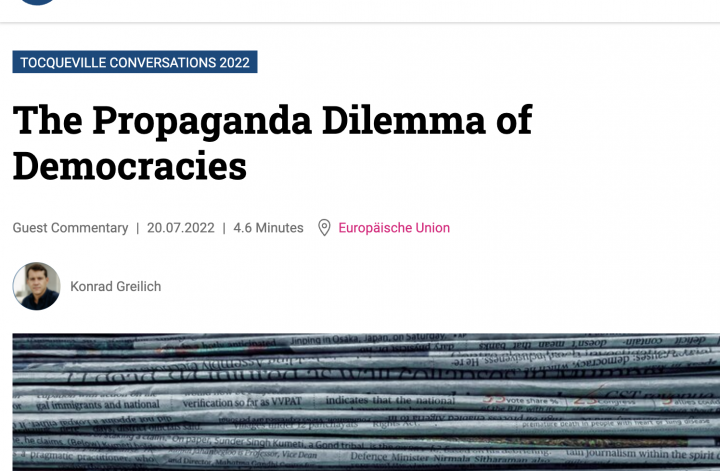
Last week the political parties that plan to form the new German Government presented their coalition agreement and their governmental agenda for the next four years. Over the weekend, I looked into the deal of the “Traffic light coalition” and tried to find out if the coalitions’ “Dare More Progress” promise, a slogan of their commitment to progressive governing, holds up when it comes to digital and technology policy. Let see where the coalition stands on civil rights, digital platforms and artificial intelligence.
Digital civil rights
After roughly two horrible decades for digital civil rights, it is instantly noticeable that the conservative party, who prevented any progress for online rights, is not a part of the agreement. As a result, some long required positive adjustments can be expected. First and foremost, the coalition expressed their full support for the individual right to encryption and wants to preserve the possibility to use online services anonymously and pseudonymously. This is a major step away from the surveillance focused agenda of the last governments and alone would be enough reason to celebrate, but the coalition is just getting started.
The coalition also specifically objects to any surveillance or identification duties when it comes to private communication and calls for the universal use of end-to-end-encryption, instead of calling to break it. And if all that wouldn’t be enough, the coalition also wants to adjust laws in order to enable private security research, while aiming to direct public agencies to focus on closing security breaches, instead of buying or using them as they’ve been doing so far.
As another cherry on top, the coalition agreement again and again states the need for Open Access to public data and that code financed by public money should be open-sourced. Security researchers might soon not only be allowed to test the public infrastructure, but also help make it better. The agenda on civil rights in general and the internet infrastructure specifically really holds up to the “Dare More Progress” promise.
Digital Platforms and content regulation
Today, most of the current issues surrounding digital policy in general and big platforms specifically are approached both on the European and on the national level. The coalition acknowledges this, seems to support more harmonization at the European level and plans to adjust the national legislation to new, harmonized European rules. The coalition agreement specifically states support for the currently pending major regulation on digital services (EU-DSA), on digital markets (EU-DMA) and the E-Privacy-Directive. Even though support for the ambitious European Legislation is explicitly stated there, the agreement does not go into much detail on how the coalition partners envision this ambitious framework on the practical level. The coalition does not want European legislation to fall behind existing national laws, strongly supports interoperability requirements and wants strong user rights, protecting the freedom of expression while still effectively fighting disinformation.
It is worth noting, though, that there may be at least some small directional decisions on two highly disputed regulatory tools.
First, I could not find a clause about “harmful content”. This could be a major hint on the direction regarding online speech. Harmful content is a newly created legal term that includes not just unlawful speech, but also lawful speech that might harm or offend others. Some proponents want to extend the strict rules regarding take-downs for private platforms on harmful content, while many civil rights activists caution and warn that this could lead to extensive filtering efforts by online platforms. Not mentioning the term could be seen as a decision against the inclusion of harmful content as a new category of speech and that the new government errs on the side of caution when it comes to the protection of free speech.
Second, the ideas on fostering competition in digital markets are a little more concrete. Next to the general call for an ambitious Digital Markets Act, the coalition states some key points regarding the content of such. The coalition agreement states clearly, that the possibility to break up companies that repeatedly harm competition is supposed to be a tool of last resort. Before breaking up Meta, the coalition wants to update anti-trust rules to avoid the emergence of dominating market players in the first place, make it easier to prevent killer-acquisitions at the European Level and strengthen the federal anti-trust agencies when it comes to digital platforms.
Artificial intelligence
Artificial intelligence is one of the trending buzzwords in politics as well as in business for a couple of years now. Everyone is scared of it; every startup seems to be developing it, but nobody really knows what the term means. The traffic-light partners don’t even try to define what artificial intelligence is, but still agreed on how to regulate it(s use). The coalition, again, explicitly supports a European approach and the Artificial Intelligence Act proposed by the European Commission. Within this the coalition calls for a risk-based approach, meaning that not the technology itself should be regulated, but its specific use. While implementing regulation of high-risk applications, the coalition wants to protect the citizens civil rights, prevent discrimination as well as ex-ante requirements for service providers. With the clearly stated opinion on the limited need for pre-approval, the coalition makes clear that the German Government will err on the side of innovation and not treat every use-case of a multi-purpose technology like a nuclear plant.
Besides the general innovation-friendly approach towards artificial intelligence regulation, the coalition acknowledges the need for civil rights protection in the context of artificial intelligence. The agreement stipulates several times, that both biometric surveillance in public spaces and social scoring by states should be banned on the European Level – another win for progress.
Dare more progress?!
When it comes to digital and technology policy, the traffic-lights coalition has indeed planned to “Dare More Progress” and fix long lasting problems in the digital sphere. I personally would have loved a little more detail about the use of the blockchain-technology to empower users in the upcoming web3-era. Nonetheless, by making user civil rights, openness and innovation guiding principles, as well as ending harmful practices like the governmental use of security breaches, the coalition agreement seems to be starting a new epoch in digital and technology politics towards more progress.



